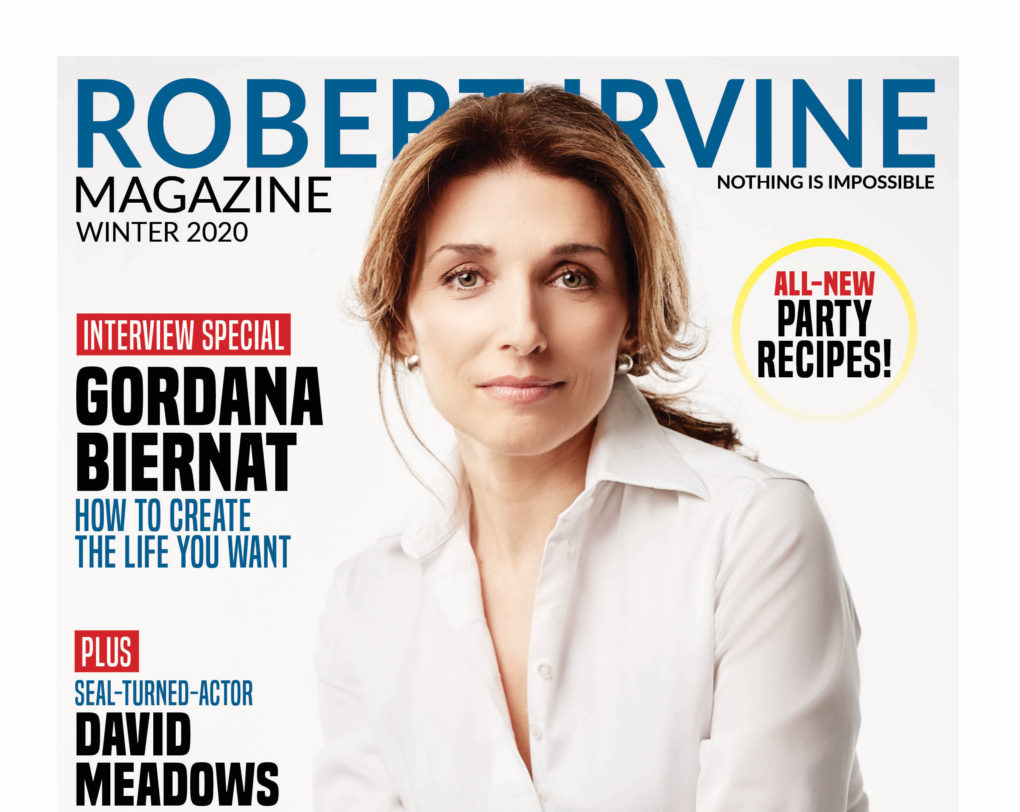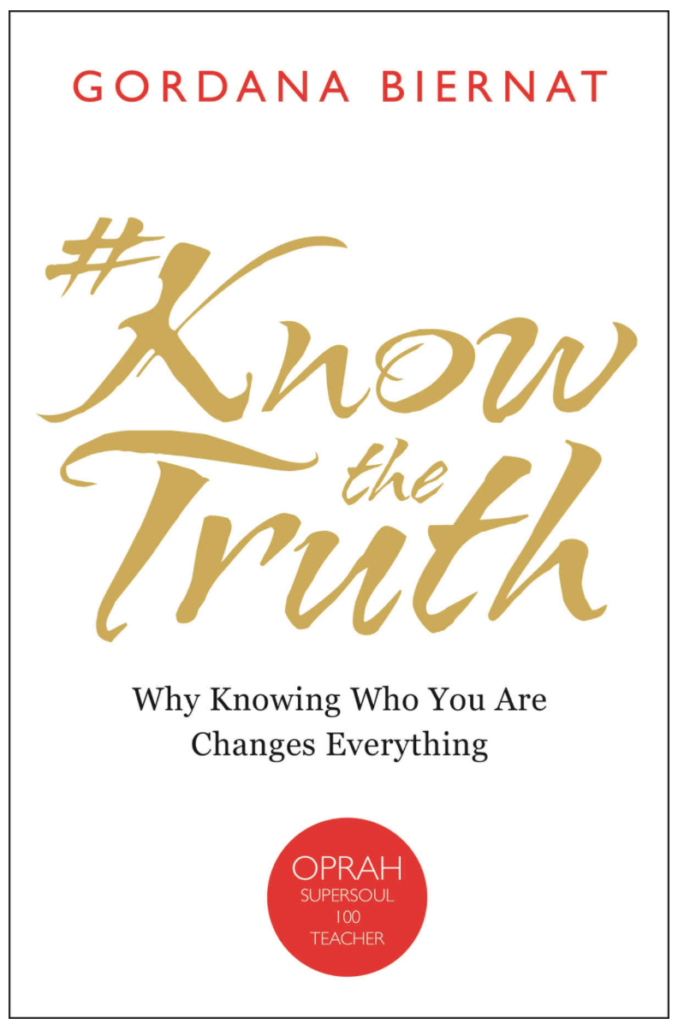
On The Cover: A Conversation with Gordana Biernat
Robert Irvine Magazine readers first met Gordana Biernat in the May 2017 issue in THIS piece where the woman named to Oprah Winfrey’s Super Soul 100 list and author of #KnowTheTruth laid out her life philosophy. For her cover interview, Gordana tackles the burning questions of the moment: from the rise of anxiety and depression to cancel culture, dealing with criticism, and how to stay focused to build the life you want. Her answers were anything but predictable and will give you plenty to think about. Read on and be inspired.
INTERVIEW BY MATT TUTHILL
RI Magazine: I point a lot of people in your direction, but I struggle to describe exactly what you do. I see a lot of people calling themselves thought leaders these days. I laugh when I see it, but in your case it’s probably accurate. How would you describe yourself?
Gordana Biernat: Thought leader is really close to what I do because I am always thinking. There’s no time when I’m not thinking. I’ve done that since I was a child, so a thinker, thought leader would be appropriate. At the same time, I don’t lead people. I kind of throw my light somewhere, and I show them, “Look here,” and they find themselves. I don’t see myself as a leader. More of a guide, but that’s also not the right way to describe me. So when I describe myself, I say that I’m an author and I’m a thinker, but thought leader is very close.
RI: There’s a tremendous amount of media attention around the rise of depression and anxiety and what they’re saying they’ve found is a correlation between that and with the amount of screen time and social media use that they have. And I feel like there’s a really kind of lazy through line that is always thrown in there: “Well, people get FOMO, or fear of missing out. They see all these idealized images on Instagram and on Facebook and they see and they think, ‘Oh, everyone else’s life is so perfect.’ And then they internalize that and compare their lives to what they’re seeing, and then they get upset.” And I just feel like that could be part of it, but it feels a little too simple, a little too easy.
I feel like it has more to do maybe with the number of voices we’re exposing ourselves to—that we’re not spending any time alone in thought. We’re just crushing our brains the second we wake up by logging on and seeing thousands of things. I don’t feel like we’re really designed to handle all of it at once, especially not all day long. What do you think?
GB: I think that it’s about understanding who you are and understanding that you always have the power to choose. We are not using that power. We’re not using our free will. We have become habitual beings. We do it because we’ve always done it. It’s not that we can’t live without our phone, and yet we have it on the bedside. And the first thing we do in the morning, we pick it up. We’re not even thinking. It’s a habitual motion to pick up the phone and start scrolling the phone. So it’s about the habit.
I don’t want people to become habitual beings. I want them to be present in the now moment. So if you are in habit all the time, then you are not present in the now moment. And if you’re not present in the now moment, then what are you doing here? You’re not even connected to who you truly are. And if you don’t know who you truly are, well then every action in this reality is, per definition, an unconscious action. So I would either describe us as a society where we are all asleep or we’re unconscious.
Also, the information that is out there. I don’t think that it’s too much information because it doesn’t matter… When you’re out in the woods, there’s a lot of information going on there, but you choose what you want to look at. And again, it’s the choice. Acknowledging that you have the choice to say, “I like that. I do not like that.” And then you don’t go where you don’t like to go. It’s very simple because when you go into the details, when you start to look at the details, the devil lives in the details. You will lose yourself in that. It is a very simple principle. It’s about acknowledging your own power to choose.
RI: You’re on every social media platform and you post a lot. But I take it that you don’t just scroll through social media. You’re using it to say what you need to say and then you’re doing something else. You’re not just looking at a feed for extended periods of time.
GB: Absolutely. I do not sit and scroll for the scrolling. have an intention with what I do on social media. I do interact with people, a lot of people. I do interact with them, but I do not allow myself to become distracted by things that I know are going to lead me down a path, which is not where I want to be. I always have an intention with what am I doing on social media. And I think that it’s important to have an intention. Why are you picking up the phone and scrolling? Because if you do not know how to answer the question, then there are subconscious reasons why you’re doing it and you’re not conscious of why you’re doing it.
So for me, it’s very, very much about being highly conscious of why am I on Twitter right now? Why am I on Facebook right now? What am I doing here? And then picking the things that truly interest me. Nothing else. Not being distracted by everything because you can’t. It’s impossible to keep all these things in your head. It scatters your mind and disconnects you from your heart, and then you don’t function as a human being.
RI: So does it make sense to you then that depression and anxiety could be correlated to social media use? Does it make sense to you that people are freaking out because they’ve been detached from what it is they want to do? Whatever intentions they had at the start of the day are instantly crushed because they get sucked into some argument online or whatever the news of the day may be.
GB: Absolutely. Of course they feel an emptiness… If I’m distracted into something that actually isn’t of my frequency, then I will feel empty when I’ve gone that path and it ends abruptly somewhere and I feel like I didn’t gain anything, I didn’t learn anything. I was just a part of emotion, and that is not a good place to be because it drains you of energy, which means that you will feel empty.
So of course there is a correlation between the two, but I think it’s not about the media. It’s about not acknowledging the choice, not knowing that you can choose. I think that people who are born into this era where everything is available, all the information you will ever need is out there, it’s hard to know that you can actually say no to it. Because it’s always been there and you’re supposed to interact everywhere because that’s how life is. But that isn’t how life is. Because when you don’t have a phone, then life becomes something different.
Above: Gordana’s book, #KnowTheTruth, which you can order HERE on Amazon and other online retailers. Follow Gordana on TWITTER, FACEBOOK, and INSTAGRAM.
RI: As I was thinking about it, I got stuck on a fitness metaphor: if someone becomes morbidly obese, you would say that that person has an energy imbalance. They’re taking in more energy than they’re expending. So there’s two ways to deal with that, right? You can exercise more, and you can eat less. This is what any doctor would tell you. These disorders, I feel, are an imbalance of the mind that can be dealt with in two ways. One is what you just said, which is cut yourself off to some degree. You can say no. You don’t have to eat everything, right? And the other way is to have more output. Exercise, use your brain, do something creative. Your brain was created to solve problems, to write things, to create art, to do something constructive. The brain wants to do something and you’re not letting it.
GB: Well, the way I see this reality, we are here as souls. We have this body and we are exploring this reality, and the exploration is about turning thoughts into things, turning energy into matter. And if you’re always consuming something and not releasing it out of you, then you’re missing the point with being here from the start. So of course that will create emotional pain to you because you’re not fulfilling your purpose here. Your purpose is to transform thoughts into something creative. That is the purpose here.
Then you can choose what thoughts you want to play around with. I mean, you can be a gardener, you can be a painter, you can be whatever you wish, but it’s about transforming a desire, an idea, into something that others can see or you can see in the physical world. And if you’re not doing that, if you’re only absorbing information, having arguments with people, doing things that are not leading you anywhere because you’re doing it habitually, then of course you will feel empty.
They say that kingdom of heaven is within you, but it feels empty because we are not present in ourselves. We are not inside of ourselves. We’re not present here. We’re not doing what we’re supposed to do here. You’re here to create. We are not here to just absorb information. It’s a very good analogy that you made. If you’re only eating and not exercising, of course it leads to death in one way or the other, and this is an emotional death.


